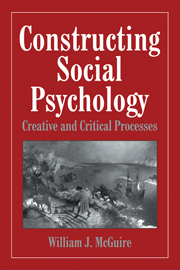Book contents
- Frontmatter
- Contents
- List of Tables and Figures
- Foreword
- 1 Learning My Way
- 2 Immunization against Persuasion
- 3 Attitude-Change Studies
- 4 Integrative Reviews of Social Influence Processes
- 5 Developing Effective Persuasion Campaigns
- 6 Thought Systems: Their Content, Structure, and Functioning
- 7 A Topography of the Phenomenal Self
- 8 Distinctiveness Theory and the Salience of Self-characteristics
- 9 Language and Thought Asymmetries
- 10 Psychology and History
- 11 Winters of Our Discontents: Crises in Social Psychology
- 12 A Perspectivist Epistemology: Knowledge as Misrepresentation
- Selected References
- Index
12 - A Perspectivist Epistemology: Knowledge as Misrepresentation
Published online by Cambridge University Press: 05 October 2013
- Frontmatter
- Contents
- List of Tables and Figures
- Foreword
- 1 Learning My Way
- 2 Immunization against Persuasion
- 3 Attitude-Change Studies
- 4 Integrative Reviews of Social Influence Processes
- 5 Developing Effective Persuasion Campaigns
- 6 Thought Systems: Their Content, Structure, and Functioning
- 7 A Topography of the Phenomenal Self
- 8 Distinctiveness Theory and the Salience of Self-characteristics
- 9 Language and Thought Asymmetries
- 10 Psychology and History
- 11 Winters of Our Discontents: Crises in Social Psychology
- 12 A Perspectivist Epistemology: Knowledge as Misrepresentation
- Selected References
- Index
Summary
[Adapted with permission from W. J. McGuire, 1986c, A perspectivist looks at contextualism and the future of behavioral science, in R. Ros-now &M. Georgoudi (Eds.), Contextualism and understanding in behavioral science: Implications for research and theory, pp. 271-301 (New York: Praeger, copyright © 1986). An imprint of Greenwood Publishing group.]
Each generation of intellectuals has a characteristic mode of wonder: Mine is an epistemological generation, whereas the preceding one was fascinated by cosmogonal issues, and the more recent generation by issues of power and publicity. I had the delight of entering psychology in an epistemological age: To paraphrase Wordsworth's Prelude, “Bliss it was in that dawn to be (a psychologist) but to be (a cognitive social psychologist) was very heaven.” Most of my varied lines of research have been pursued with the metamotivation of grasping what it is “to understand.” The descriptive and prescriptive principles for the advancement of behavioral science knowledge outlined in this chapter derive from my tragic view of knowledge called “perspectivisim,” which recognizes knowledge as a necessary but essentially flawed mode of representational coping with an overly complex self and environment.
My epistemologically oriented cohort that entered psychology around midcentury was concerned with the nature of knowledge – its internal structure, its relations to the world it represents and to the language in which it is expressed. In this preoccupation we were heirs of early-twentieth-century philosophers like Peirce, James, Dewey, and the pragmatists; Wienerkreis affiliates such as Schlick, Carnap, Hempel, Feigl, Bergman, and Popper; Russell, Whitehead, Wittgenstein, and a gaggle of British or other word quibblers.
- Type
- Chapter
- Information
- Constructing Social PsychologyCreative and Critical Aspects, pp. 395 - 432Publisher: Cambridge University PressPrint publication year: 1999
- 1
- Cited by



